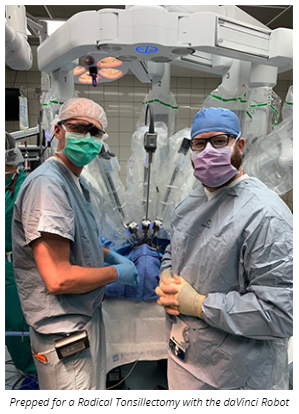How to Choose an ENT Over a General Practitioner for Persistent Issues
How to Choose an ENT Over a General Practitioner for Persistent Issues
Blog Article
Checking out the Field of Otolaryngology: What to Anticipate When You Get In Touch With an ENT
Otolaryngology, frequently referred to as ENT, incorporates the diagnosis and treatment of throat, nose, and ear disorders. For those experiencing associated concerns, speaking with an ENT expert can supply clarity and alleviation. Comprehending what to expect throughout such consultations is important for efficient communication and care. This overview will certainly outline essential elements of the ENT experience, consisting of typical reasons for brows through and the procedures associated with medical diagnosis and therapy.

Understanding Otolaryngology: A Summary
Otolaryngology, typically described as ENT (Throat, nose, and ear) medicine, is a specialized branch of medication that concentrates on the medical diagnosis and therapy of conditions influencing these essential areas of the human body. This field incorporates a large range of problems, consisting of those pertaining to hearing, equilibrium, respiratory system feature, and speech. Otolaryngologists are educated to manage both surgical and medical therapies, making use of innovative strategies and innovations. Their expertise extends past standard ailments, addressing issues such as allergic reactions, sinus infections, and hearing loss. Furthermore, they play an essential duty in the monitoring of head and neck cancers, supplying detailed treatment customized to private client needs. Generally, otolaryngology continues to be vital for maintaining wellness and high quality of life in affected individuals.
Common Factors to See an ENT Professional
Numerous people look for the proficiency of an ENT specialist for a range of factors, showing the diverse nature of problems that influence the throat, nose, and ear. Usual issues consist of persistent sinusitis, which typically results in relentless nasal congestion and facial discomfort. Allergic reactions and their associated signs and symptoms, such as sneezing and itching, additionally trigger brows through to these specialists (Otolaryngologist). Hearing loss, whether abrupt or progressive, is another substantial reason for assessment. On top of that, people might seek assessment for throat disorders, including persistent hoarseness or ingesting problems. Sleep apnea, identified by cut off breathing during sleep, is often addressed by ENT experts also. Each of these conditions highlights the relevance of specialized treatment in managing complicated ENT-related wellness problems
Planning for Your ENT Appointment
When getting ready for an ENT consultation, it is important to gather relevant information and take into consideration any kind of particular concerns. People must compile an in-depth medical background, including previous ear, nose, or throat problems, surgical procedures, and current medications. Documenting signs and symptoms-- such as period, regularity, and intensity-- can supply important insights for the ENT professional. In addition, individuals must prepare a listing of concerns they wish to ask, making sure that all problems are resolved throughout the browse through. Bringing along any type of relevant clinical documents or examination results can further aid the ENT in recognizing the patient's problem. Patients ought to validate their appointment details, including day, area, and time, to reduce any last-minute confusion. Correct prep work can enhance the efficiency of the assessment and lead to better results.
What to Expect Throughout the Appointment
As the appointment begins, the client can expect to take part in a complete discussion with the ENT expert concerning their signs and case history. The expert will ask about the period, frequency, and extent of signs such as hearing loss, nasal blockage, or aching throat. In addition, the client's previous medical problems, medications, and any type of appropriate family background will certainly be examined, helping the specialist in creating a complete understanding of the client's health and wellness. The ENT might also inquire about way of living elements, such as direct exposure to irritants or allergens. This open dialogue establishes a foundation for the assessment, guaranteeing that the patient's issues are attended to and setting the stage for any type of essential evaluations or referrals for therapy.
Diagnostic Examinations and Procedures in Otolaryngology
A variety of analysis tests and treatments are vital in otolaryngology to accurately examine and diagnose conditions influencing the nose, ear, and throat. Typical examinations include audiometry, which measures hearing feature, and tympanometry, evaluating center ear stress. Nasal endoscopy enables visualization of the nasal passages and sinuses, while laryngoscopy checks out the throat and singing cords. Imaging strategies, such as CT scans and MRIs, provide thorough views of head and neck structures. Allergic reaction screening might also be carried out to identify triggers for sinus or respiratory problems. These analysis tools enable ENT experts to create a thorough understanding of patients' conditions, making certain tailored and effective management strategies. Correct medical diagnosis is crucial for successful therapy outcomes in otolaryngology.
Treatment Choices Provided by ENT Specialists
ENT experts supply a range of therapy options tailored to deal with specific problems influencing the nose, ear, and throat. These treatments vary from traditional techniques, such as medication and way of life alterations, to more intrusive procedures. Allergic reactions may be taken care of with antihistamines or immunotherapy, while chronic sinus problems could call for nasal corticosteroids or sinus surgery. For hearing loss, ENT specialists commonly recommend listening devices or medical interventions like cochlear implants. In instances of throat problems, alternatives can include speech treatment or procedures to remove blockages. Furthermore, they might offer advice for handling rest apnea, including the usage of CPAP tools or surgical interventions. Generally, the goal is to improve clients' lifestyle through personalized care and effective therapy approaches.
When to Look For Follow-Up Care With an ENT
Acknowledging when to look for follow-up treatment with an ENT professional is essential for taking care of ongoing symptoms or issues associated to throat, ear, and nose conditions. Patients need to think about arranging a follow-up appointment if signs and symptoms linger regardless of first treatment, such as chronic ear discomfort, nasal blockage, or throat discomfort. Adjustments in hearing, balance problems, or unusual nasal discharge may also warrant more evaluation. Furthermore, if a patient experiences negative effects from recommended medications or has actually gone through a procedure, follow-up care is necessary to keep an eye on recuperation and address any type of concerns. Timely consultations can assure efficient monitoring of problems, prevent prospective issues, and give comfort pertaining to one's health. Seeking follow-up care promotes proactive health monitoring in otolaryngology.
Frequently Asked Inquiries

What Qualifications Should I Seek in an ENT Professional?
When seeking an ENT professional, one must try to find board accreditation, relevant experience, and solid individual testimonials. Additionally, effective interaction skills and a caring method can greatly enhance the total treatment experience.
Exactly how Do I Pick the Right ENT for My Requirements?
Picking the appropriate ENT expert includes evaluating their qualifications, experience, and person reviews (Hearing). It is necessary to ponder their communication style and technique to therapy, ensuring they line up with the individual's particular health requirements and choices
Exist Any Threats Connected With ENT Procedures?
The risks connected with ENT procedures might consist of infection, blood loss, anesthesia problems, and potential damage to bordering structures. Clients ought to go over these threats with their physician to comprehend individual worries and assurance notified decisions.
How Can I Take Care Of Stress And Anxiety Prior To My ENT Visit?
To take care of anxiousness prior to a consultation, individuals can exercise deep breathing exercises, picture favorable outcomes, prepare concerns ahead of time, and look for support from friends or family members, cultivating a sense of reassurance and peace.
What Should I Do if I Experience Negative Effects From Treatment?
The person must immediately report them to their health care provider if side results from treatment take place. Changes to treatment or extra interventions might be needed to website ensure security and efficiency in handling their problem - ENT Doctor. As the assessment starts, the person can anticipate to involve in a thorough conversation with the ENT expert concerning their signs and clinical background. These diagnostic devices allow ENT experts to create an extensive understanding of clients' problems, ensuring tailored and effective administration plans. ENT specialists provide a variety of therapy choices customized to address details problems influencing the ear, throat, and nose. When seeking an ENT professional, one must look for board certification, pertinent experience, and strong client evaluations. Picking the best ENT expert involves assessing their qualifications, experience, and client reviews
Report this page